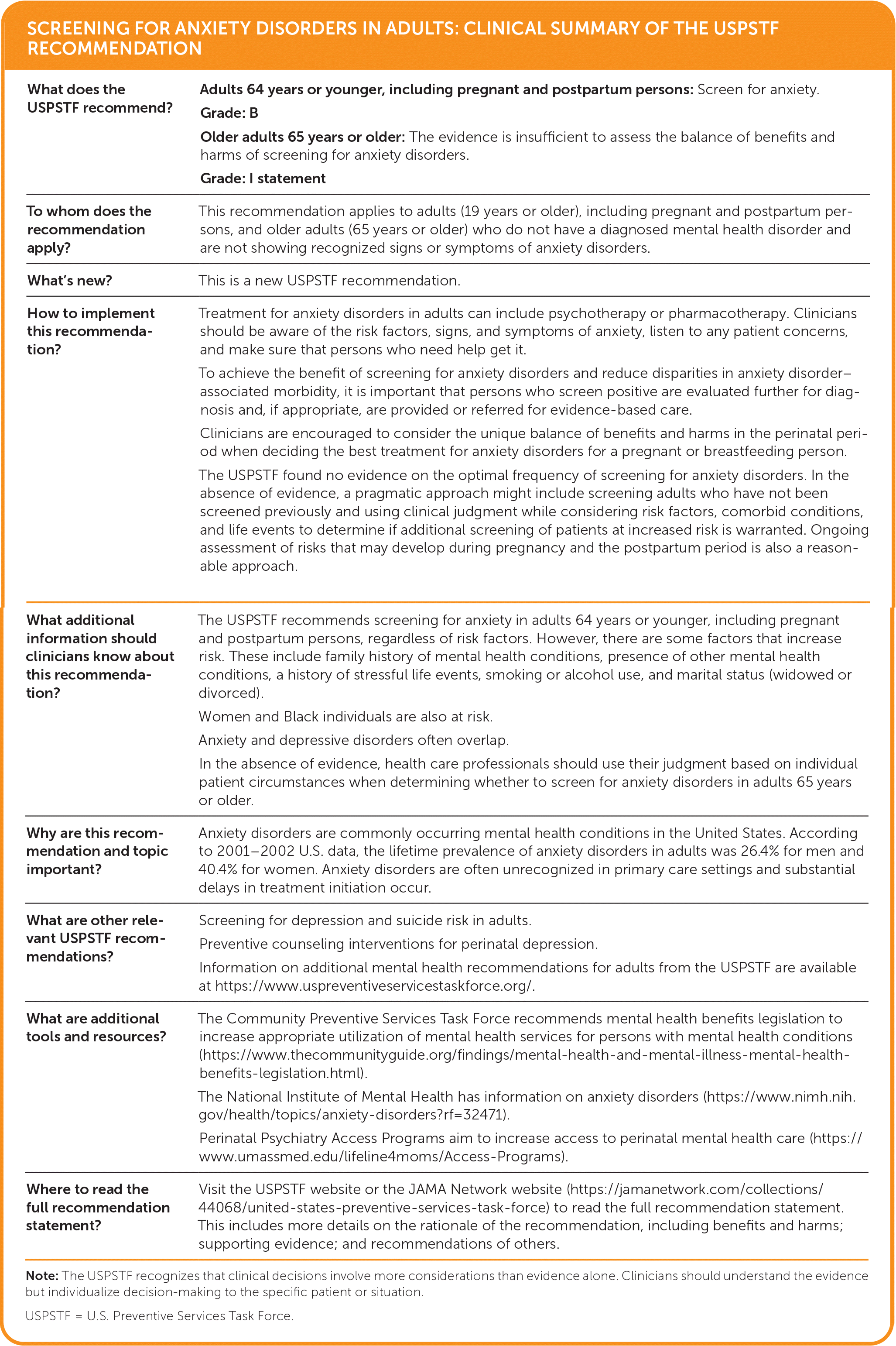
Am Fam Physician. 2024;109(5):online
Related Putting Prevention Into Practice: Screening for Anxiety Disorders in Adults
As published by the USPSTF.

| What does the USPSTF recommend? | Adults 64 years or younger, including pregnant and postpartum persons: Screen for anxiety. Grade: B Older adults 65 years or older: The evidence is insufficient to assess the balance of benefits and harms of screening for anxiety disorders. Grade: I statement |
| To whom does the recommendation apply? | This recommendation applies to adults (19 years or older), including pregnant and postpartum persons, and older adults (65 years or older) who do not have a diagnosed mental health disorder and are not showing recognized signs or symptoms of anxiety disorders. |
| What's new? | This is a new USPSTF recommendation. |
| How to implement this recommendation? | Treatment for anxiety disorders in adults can include psychotherapy or pharmacotherapy. Clinicians should be aware of the risk factors, signs, and symptoms of anxiety, listen to any patient concerns, and make sure that persons who need help get it. To achieve the benefit of screening for anxiety disorders and reduce disparities in anxiety disorder–associated morbidity, it is important that persons who screen positive are evaluated further for diagnosis and, if appropriate, are provided or referred for evidence-based care. Clinicians are encouraged to consider the unique balance of benefits and harms in the perinatal period when deciding the best treatment for anxiety disorders for a pregnant or breastfeeding person. The USPSTF found no evidence on the optimal frequency of screening for anxiety disorders. In the absence of evidence, a pragmatic approach might include screening adults who have not been screened previously and using clinical judgment while considering risk factors, comorbid conditions, and life events to determine if additional screening of patients at increased risk is warranted. Ongoing assessment of risks that may develop during pregnancy and the postpartum period is also a reasonable approach. |
| What additional information should clinicians know about this recommendation? | The USPSTF recommends screening for anxiety in adults 64 years or younger, including pregnant and postpartum persons, regardless of risk factors. However, there are some factors that increase risk. These include family history of mental health conditions, presence of other mental health conditions, a history of stressful life events, smoking or alcohol use, and marital status (widowed or divorced). Women and Black individuals are also at risk. Anxiety and depressive disorders often overlap. In the absence of evidence, health care professionals should use their judgment based on individual patient circumstances when determining whether to screen for anxiety disorders in adults 65 years or older. |
| Why are this recommendation and topic important? | Anxiety disorders are commonly occurring mental health conditions in the United States. According to 2001–2002 U.S. data, the lifetime prevalence of anxiety disorders in adults was 26.4% for men and 40.4% for women. Anxiety disorders are often unrecognized in primary care settings and substantial delays in treatment initiation occur. |
| What are other relevant USPSTF recommendations? | Screening for depression and suicide risk in adults. Preventive counseling interventions for perinatal depression. Information on additional mental health recommendations for adults from the USPSTF are available at https://www.uspreventiveservicestaskforce.org/. |
| What are additional tools and resources? | The Community Preventive Services Task Force recommends mental health benefits legislation to increase appropriate utilization of mental health services for persons with mental health conditions (https://www.thecommunityguide.org/findings/mental-health-and-mental-illness-mental-health-benefits-legislation.html). The National Institute of Mental Health has information on anxiety disorders (https://www.nimh.nih.gov/health/topics/anxiety-disorders?rf=32471). Perinatal Psychiatry Access Programs aim to increase access to perinatal mental health care (https://www.umassmed.edu/lifeline4moms/Access-Programs). |
| Where to read the full recommendation statement? | Visit the USPSTF website or the JAMA Network website (https://jamanetwork.com/collections/44068/united-states-preventive-services-task-force) to read the full recommendation statement. This includes more details on the rationale of the recommendation, including benefits and harms; supporting evidence; and recommendations of others. |
The full recommendation statement is available at https://www.uspreventiveservicestaskforce.org/uspstf/recommendation/anxiety-adults-screening.
The USPSTF recommendations are independent of the U.S. government. They do not represent the views of the Agency for Healthcare Research and Quality, the U.S. Department of Health and Human Services, or the U.S. Public Health Service.
